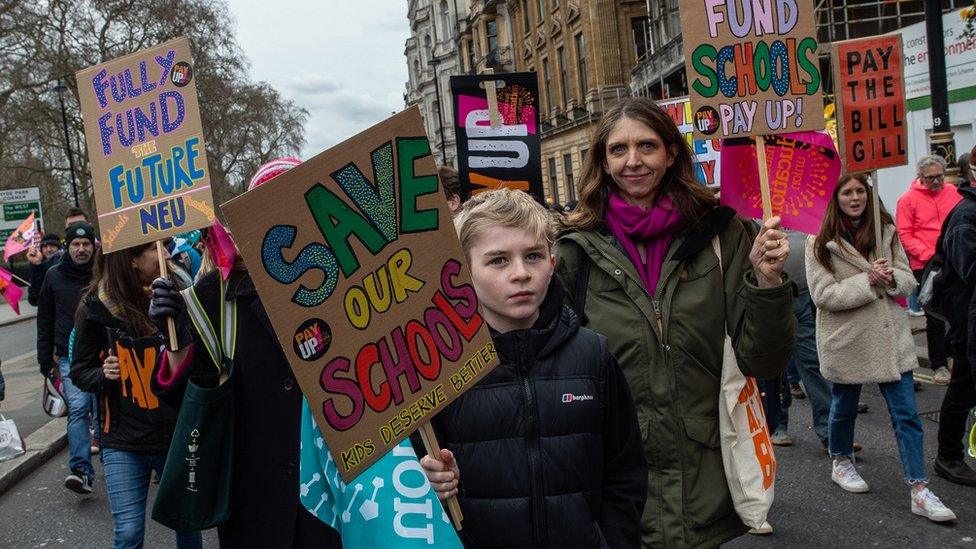More than half of England's schools disrupted by strikes
- Published

Families joined teachers on a protest march in London on Wednesday
More than 50% of schools in England closed or restricted attendance because of this week's teachers' strikes, according to government data.
Teachers belonging to the National Education Union (NEU) walked out on 15 and 16 March.
On 15 March, junior doctors, civil servants, London Underground train drivers and some BBC staff also took strike action.
It was one of the biggest days of action since the wave of unrest began.
Data released by the Department for Education showed 47% of all schools in England were open but restricting attendance, and 6% were fully closed on both strike days this week.
Secondary schools were worst affected, with 79% restricting attendance and 5% fully closed on 15 March. On 16 March, 80% restricted attendance and 6% were shut.
London had the highest proportion of affected schools, with only 18% able to fully open on both strike days.

'It's just super-frustrating'
In Manchester, mum Alison Dickinson had to juggle work and childcare again this week, with daughter Liv's school closed because of the strikes.
It was Liv's fourth day of school missed since the first national teachers' strike on 1 February.

Single mum Alison was working from home on the strike days while looking after daughter Liv
Alison's dad Pete travelled down from Preston to their home in Sale and stayed overnight to help with childcare.
But Alison said eight-year-old Liv has been struggling with the disruption.
"I think I understand the bigger picture - but it's just super-frustrating," said Alison, who runs after-school singing and drama classes for children.
"Liv's year especially, they've only had one normal year of school with no disruption, which was last year, but now every couple of weeks there's a random day off and it's so disruptive."
Speaking on Wednesday, Alison added: "She'll be all over the place tomorrow - day two - and although they think it's a novelty and fun being off school, I think she'll be bored stiff tomorrow, missing her friends, missing school, because that's her world.
"They spend so much time there, so to have that routine broken - it's a lot."

Teachers' salaries fell by an average of 11% in real terms between 2010 and 2022, according to the Institute for Fiscal Studies. Unions claim teacher pay has fallen by as much as 23% in that time.
In England, most teachers had a 5% rise last year.
Unions argue these are pay cuts because of inflation, but the government says it has already agreed to an extra £2bn in school funding in England.
The NEU is calling for a fully-funded pay rise, so that any rise does not have to be paid out of schools' existing budgets.
In Wales, strike action was called off this week while the NEU consults with members on a recent offer.
In Scotland, strikes have also been suspended after the Educational Institute of Scotland and the Scottish Secondary Teachers' Association accepted a new pay deal. The NASUWT is still consulting its members.
- Published15 April
